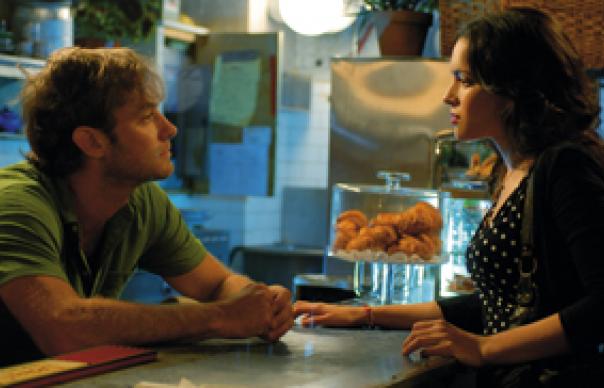DIR: Wong Kar-Wei ST: Norah Jones, Jude Law, Rachel Weisz, Natalie Portman In his native Hong Kong, Wong Kar-Wai built a reputation as a master of mood, spinning gorgeous stories of desire and yearning. His 1994 film Chungking Express, a pop-culture love story scored with The Mamas And The Papas' "California Dreaming", melted Quentin Tarantino's heart enough for him to release it in the US, but it was with the intoxicating In The Mood For Love (2000), about a middle class couple conducting a chaste affair in the 60s, that he created his grown-up, romantic masterpiece. By writing Blueberry Nights in English and shooting in the US, however, the once enigmatic master has lost his exotic appeal: lines that seemed naive and charming in subtitle form now seem rather awful when spoken out loud, and his smoky, impressionistic cinematography isn't enough to cover for it. Part of the problem is the casting, and though Norah Jones makes a decent fist of her acting debut, this is largely because her character, Elizabeth, is so passive that not much more is required than a wistful gaze. Jilted by her lover, Elizabeth first finds solace in a Manhattan cafe owned by ex-pat Jeremy (Jude Law), but her heartache won't heal and she sets off on a cross-country trip. The scenes with Law get things off to a wooden start, and a melodramatic vignette in Memphis with Rachel Weisz doesn't really improve matters, but a final section in Vegas, with a surprisingly credible Natalie Portman as damaged, flaky gambler, finally puts some substance into this showcase of style. DAMON WISE
DIR: Wong Kar-Wei
ST: Norah Jones, Jude Law, Rachel Weisz, Natalie Portman
In his native Hong Kong, Wong Kar-Wai built a reputation as a master of mood, spinning gorgeous stories of desire and yearning. His 1994 film Chungking Express, a pop-culture love story scored with The Mamas And The Papas’ “California Dreaming”, melted Quentin Tarantino’s heart enough for him to release it in the US, but it was with the intoxicating In The Mood For Love (2000), about a middle class couple conducting a chaste affair in the 60s, that he created his grown-up, romantic masterpiece. By writing Blueberry Nights in English and shooting in the US, however, the once enigmatic master has lost his exotic appeal: lines that seemed naive and charming in subtitle form now seem rather awful when spoken out loud, and his smoky, impressionistic cinematography isn’t enough to cover for it.
Part of the problem is the casting, and though Norah Jones makes a decent fist of her acting debut, this is largely because her character, Elizabeth, is so passive that not much more is required than a wistful gaze. Jilted by her lover, Elizabeth first finds solace in a Manhattan cafe owned by ex-pat Jeremy (Jude Law), but her heartache won’t heal and she sets off on a cross-country trip. The scenes with Law get things off to a wooden start, and a melodramatic vignette in Memphis with Rachel Weisz doesn’t really improve matters, but a final section in Vegas, with a surprisingly credible Natalie Portman as damaged, flaky gambler, finally puts some substance into this showcase of style.
DAMON WISE



